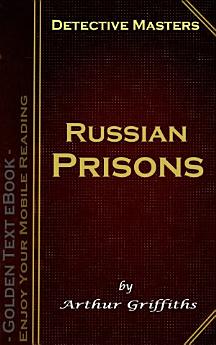Russian Prisons: Detective Masters
Arthur Griffiths
Mär 2017 · Detective Masters Buch 5 · Golden Text
E-Book
221
Seiten
reportBewertungen und Rezensionen werden nicht geprüft Weitere Informationen
Über dieses E-Book
Commencement of judicial reform in Russia—Abandonment of knout and branding iron—The plet—Two classes of prisons, the “lock-up” and the “central” or convict prisons—Experiences of a woman exiled from Russia—Testimony of Carl Joubert—The state of the central prisons—The “model” prison in St. Petersburg—Punishments inflicted—The food in different prisons—Attempted escapes—Myshkin—His early history and daring exploits—Failure of his plan to rescue Chernyshevski from Siberia—His escape, recapture, and sentence of death—The prisoner Medvediev.
A definite movement toward judicial reform began in Russia in the early sixties. The old law courts with their archaic procedure and evil repute as sinks of bribery and corruption were abolished. Trial by jury was revived, and justices of the peace were established to dispose of the smaller criminal offences. Shortly afterward, two of the most disgraceful features in the Russian penal code, the knout and the branding iron, disappeared. The punishment of splitting the nostrils to mark ineffaceably the prisoners exiled to the salt mines of 14Okhotsk also ceased, and the simple Chinese no longer were surprised with the sight of a hitherto unknown race of men with peculiar features of their own. The knout, however, had long served its devilish purpose. It was inflicted even upon women in the time of Peter the Great, and was still remembered as an instrument which would surely kill at the thirtieth stroke, although in the hands of a skilful performer a single blow might prove fatal.
A definite movement toward judicial reform began in Russia in the early sixties. The old law courts with their archaic procedure and evil repute as sinks of bribery and corruption were abolished. Trial by jury was revived, and justices of the peace were established to dispose of the smaller criminal offences. Shortly afterward, two of the most disgraceful features in the Russian penal code, the knout and the branding iron, disappeared. The punishment of splitting the nostrils to mark ineffaceably the prisoners exiled to the salt mines of 14Okhotsk also ceased, and the simple Chinese no longer were surprised with the sight of a hitherto unknown race of men with peculiar features of their own. The knout, however, had long served its devilish purpose. It was inflicted even upon women in the time of Peter the Great, and was still remembered as an instrument which would surely kill at the thirtieth stroke, although in the hands of a skilful performer a single blow might prove fatal.
Autoren-Profil
Arthur George Frederick Griffiths (9 December 1838 – 24 March 1908) was a prison administrator and author who published more than 60 books during his lifetime. He was also a military historian who wrote extensively about the wars of the 19th century, and was for a time military correspondent for The Times newspaper.
His later accounts of crime and punishment in England were "sensational and grotesque", designed to appeal to the baser fascinations of his Victorian readers. Their success led him to write mystery crime novels such as Fast and Loose, published in 1885.
His later accounts of crime and punishment in England were "sensational and grotesque", designed to appeal to the baser fascinations of his Victorian readers. Their success led him to write mystery crime novels such as Fast and Loose, published in 1885.
Dieses E-Book bewerten
Deine Meinung ist gefragt!
Informationen zum Lesen
Smartphones und Tablets
Nachdem du die Google Play Bücher App für Android und iPad/iPhone installiert hast, wird diese automatisch mit deinem Konto synchronisiert, sodass du auch unterwegs online und offline lesen kannst.
Laptops und Computer
Im Webbrowser auf deinem Computer kannst du dir Hörbucher anhören, die du bei Google Play gekauft hast.
E-Reader und andere Geräte
Wenn du Bücher auf E-Ink-Geräten lesen möchtest, beispielsweise auf einem Kobo eReader, lade eine Datei herunter und übertrage sie auf dein Gerät. Eine ausführliche Anleitung zum Übertragen der Dateien auf unterstützte E-Reader findest du in der Hilfe.










